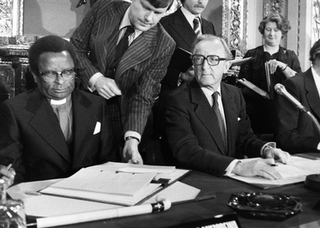Related Research Articles

Land reform in Zimbabwe officially began in 1980 with the signing of the Lancaster House Agreement, as an effort to more equitably distribute land between black subsistence farmers and white Zimbabweans of European ancestry, who had traditionally enjoyed superior political and economic status. The programme's stated targets were intended to alter the ethnic balance of land ownership.

Masvingo is a province in southeastern Zimbabwe. It has a population of 1.485 million as of the 2012 census, ranking fifth out of Zimbabwe's ten provinces. Established as Victoria Province by the British South Africa Company, it was one of the five original provinces of Southern Rhodesia. In 1982, two years after Zimbabwean independence, it was renamed Masvingo Province. The province is divided into seven districts, including Masvingo District, which contains the provincial capital Masvingo City.
Chimurenga is a word in the Shona language. The Ndebele equivalent, though not as widely used since the majority of Zimbabweans are Shona speaking, is Umvukela, roughly meaning "revolutionary struggle" or uprising. In specific historical terms, it also refers to the Ndebele and Shona insurrections against administration of the British South Africa Company during the late 1890s—the Second Matabele War, or First Chimurenga—and the war fought between African nationalist guerrillas and the predominantly white Rhodesian government during the 1960s and 1970s—the Rhodesian Bush War, or Second Chimurenga/Imvukela.

The Lancaster House Agreement, signed on 21 December 1979, declared a ceasefire, ending the Rhodesian Bush War; and directly led to Rhodesia achieving internationally recognised independence as Zimbabwe. It required the imposition of direct British rule, nullifying the Unilateral Declaration of Independence of 1965. British governance would be strictly prescribed to the duration of a proposed election period; after which independence would follow with a newly elected government. Crucially, the political wings of the black nationalist groups ZANU and ZAPU, who had been waging an increasingly violent insurgency, would be permitted to stand candidates in the forthcoming elections. This was however conditional to compliance with the ceasefire and the verified absence of voter intimidation.

Mashonaland is a region in northern Zimbabwe.

Nehanda Charwe Nyakasikana also known as Mbuya Nehanda was a svikiro, or spirit medium of the Zezuru Shona people. She was a medium of Nehanda, a female Shona mhondoro.(powerful and respected ancestral spirit) As one of the spiritual leaders of the Shona, she was one of the leaders of a revolt, the Chimurenga, against the British South Africa Company's colonisation of Zimbabwe led by Cecil John Rhodes in 1889. She was a Hera of the Hwata Mufakose Dynasty. She and her ally who some historians claim was her husband, Sekuru Kaguvi were eventually captured and executed by the Company on charges of murder. She has been commemorated by Zimbabweans through the building of statues in her name, street names, hospitals, songs, novels, and poems. The legacy of the medium continued to be linked to the theme of resistance, particularly the guerrilla war that began in 1972. Her name became of increasing importance to the nationalist movements in Zimbabwe.
Aeneas Soko Chigwedere was a Zimbabwean politician, historian, educationist, and traditional leader. He served as the Minister of Education, Sports, & Culture since August 2001, and was appointed the Resident Minister and Governor of Mashonaland East Province in August 2008. He was installed as Headman Svosve Mubayiwa on 10 March 2008. On 22 January 2021, he died at his farm near Marondera after suffering from COVID-19 related complications during the COVID-19 pandemic in Zimbabwe.
Articles related to Zimbabwe include:

Bernard Mizeki College is an independent boarding school for boys situated in Marondera, Zimbabwe approximately 87 km east of the capital Harare and or 13.5 km north east of Marondera town. It was founded in memory of Bernard Mizeki, an African martyr who died in the Marondera area. The school was established by leading private individuals of the Anglican Church in the then Rhodesia through a deed of trust drafted in 1958 and registered on 29 May 1959 at Harare. The college was established predominantly for African boys however over the years there were girls who attended the college.

Harare Metropolitan Province is a province in northeastern Zimbabwe. It comprises Harare, the country's capital and most populous city, and two other municipalities, Chitungwiza and Epworth. Originally part of Mashonaland Province, in 1983 the province was divided into three large provinces, Mashonaland Central, Mashonaland East, and Mashonaland West, while the city of Harare became its own metropolitan province, along with two nearby cities. Harare Province is divided into four districts. Miriam Chikukwa is the current provincial governor.
Alamein Farm, also known as Ruzambu Farm, is a 5,000 hectare farm at Beatrice, in the Mashonaland East area of Zimbabwe, 72 km south of the capital Harare. It was a highly productive commercial farming operation, employing around one thousand people and producing large quantities of tobacco, maize and Rhodes grass, as well as cattle and farmed game. The farm gained notoriety in 2002, when General Solomon Mujuru and his wife, Zimbabwean Vice President Joice Mujuru, evicted the farm owner and all farm inhabitants under the auspices of the Land Reform Programme, and became the first of President Robert Mugabe's inner circle to be found guilty of unlawful land seizures. Under General Mujuru, the farm continued to produce tobacco, maize and game. Farm workers also produced their own tobacco on land allocated to them.

Paul Tangi Mhova Mkondo was a Zimbabwean nationalist, part of the first group of Gonakudzingwa restriction camp political prisoners, Pioneer Insurance Executive, Business magnate, Academic, philanthropist, conservationist, pioneer Indigenous businessman and entrepreneur.
Dunn Mabika Hove, also known as Paris Checherere was a Zimbabwean military intelligence officer who was one of the leaders of ZANLA, Robert Mugabe's guerrilla forces during the Rhodesian Bush War. A career soldier, in post-independence Zimbabwe, he went on to have a successful career in the Zimbabwe National Army, serving with distinction in UN and AU led peace keeping missions across Africa.

David Ishemunyoro Godi Karimanzira was a Zimbabwean politician and cabinet minister.
Christopher Hatikure Mutsvangwa is a Zimbabwean politician, diplomat and businessman. A veteran of the Rhodesian Bush War, Mutsvangwa served the government of independent Zimbabwe and the ZANU-PF party in a number of roles, including as Director-General of the Zimbabwe Broadcasting Corporation, Ambassador to China, head of the Zimbabwe National Liberation War Veterans Association, and Veterans' Welfare Minister.
Ronald Takawira Douglas Sadomba was a Rhodesian politician who served in the House of Assembly from 1970 to 1979. In 1979, he served in the Parliament of the short-lived Rhodesian successor state, Zimbabwe Rhodesia, prior to Zimbabwe's independence. He entered politics as a member of the Centre Party, and changed parties several times, joining throughout his career the African National Council, the United African National Council, ZANU–PF, and United Parties.

Vangelis Peter Haritatos is a Zimbabwean businessman and politician who has served as Deputy Minister for Lands, Agriculture, Water, Climate and Rural Resettlement and a Member of the National Assembly of Zimbabwe for Muzvezve since 2018. Haritatos is a member of the ruling ZANU–PF and his father, Peter Haritatos, was previously an MP for the same party.
Welshman Hadane Mabhena was a Zimbabwean politician and governor of Matabeleland North. He was the first Deputy Speaker of Parliament from then Zimbabwe African People's Union (ZAPU) following the signing of Unity Accord in 1987. During the Gukurahundi era, he was labelled a dissident and was arrested and detained. Mabhena was conferred with a National Hero honour in October 2010 by President Robert Mugabe but his family declined because Mebhena had instructed that he did not want to be buried at the National Heroes Acre in Harare along with other ZANU-PF members due to political squabble he had with Mugabe a decade earlier.
Stephen Jeqe Nyongolo Nkomo was a Zimbabwean nationalist, politician and Governor of Matabeleland South Province. Nkomo was a Resident Minister and senior member of the Central Committee of Politburo of the ruling Zanu-PF party. He died in 2003 while serving as Governor of Matabeleland South Province.
Joel Biggie Matiza was a Zimbabwean politician and the Minister of Transport and Infrastructural Development since 2018. He died from COVID-19 on 22 January 2021.
References
- ↑ "Veteran politician Peter Chanetsa to be buried at National Heroes Acre". Bulawayo24 News. Retrieved 2020-08-17.
- 1 2 News, The Sunday. "Hero who tamed white farmers laid to rest". The Sunday News. Retrieved 2020-08-17.
- ↑ "Former governor and veteran nationalist Peter Chanetsa dies". Nehanda Radio. 2017-01-02. Retrieved 2020-08-17.
- ↑ "Rest in peace Cde Chanetsa! …pioneer of land reform | Celebrating Being Zimbabwean" . Retrieved 2020-08-17.
- ↑ Herald, The. "Peter Chanetsa national hero". The Herald. Retrieved 2020-08-17.
- ↑ "Peter Chanetsa national hero". Nehanda Radio. 2017-01-06. Retrieved 2020-08-17.
- ↑ Herald, The. "Veteran nationalist Peter Chanetsa dies". The Herald. Retrieved 2020-08-17.